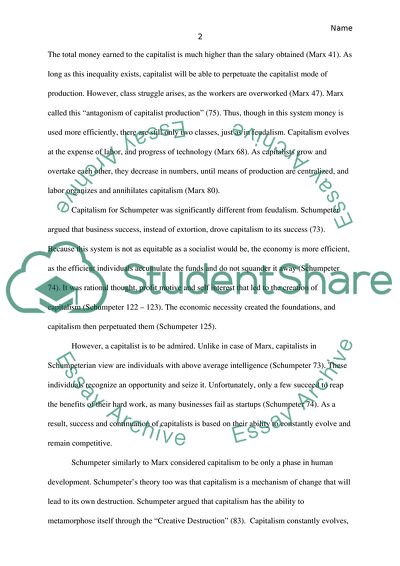
- Home
- Free Samples
- Premium Essays
- Editing Services
- Extra Tools
- Essay Writing Help
- About Us
- Studentshare
- Subjects
- Miscellaneous
- Discuss how Joseph Schumpeter's view of capitalism differs from the views both of Marx and of economists who favor vigorous competition
Discuss how Joseph Schumpeter's view of capitalism differs from the views both of Marx and of economists who favor vigorous competition - Essay Example

- Subject: Miscellaneous
- Type: Essay
- Level: Masters
- Pages: 4 (1000 words)
- Downloads: 0
- Author: nadereugene
Extract of sample "Discuss how Joseph Schumpeter's view of capitalism differs from the views both of Marx and of economists who favor vigorous competition"
In comparison to Schumpeter, Smith argued that only external factors such as corruption and idleness can destroy capitalism. Hayek added socialism to the list. In short, Schumpeter advocated the middle road between the two extremes. For Marx, capitalism is based on accumulation of money. A capitalist sees his purpose in never ending accumulation of capital, which is surplus value acquired from sale of commodities, industrial goods or interest on a loan (Marx 9 - 11). Due to the accumulated money, the capitalist is able to hire labor (Marx 18).
However, capitalism creates classes, antagonistic to each other. Until capitalism was created through accumulation of wealth and a necessary mode of production that enabled large scale production, labor could not be hired in exchange for money (Marx 18). As a result, capitalism is a product of historical developments and changes in production techniques (Marx 19). However, capitalism creates tensions. Labor is paid only the subsistence wage so that it can keep on producing, while providing the capitalist with maximum profits (Marx 19).
The total money earned to the capitalist is much higher than the salary obtained (Marx 41). As long as this inequality exists, capitalist will be able to perpetuate the capitalist mode of production. However, class struggle arises, as the workers are overworked (Marx 47). Marx called this “antagonism of capitalist production” (75). Thus, though in this system money is used more efficiently, there are still only two classes, just as in feudalism. Capitalism evolves at the expense of labor, and progress of technology (Marx 68).
As capitalists grow and overtake each other, they decrease in numbers, until means of production are centralized, and labor organizes and annihilates capitalism (Marx 80). Capitalism for Schumpeter was significantly different from feudalism. Schumpeter argued that business success, instead
...Download file to see next pages Read MoreCHECK THESE SAMPLES OF Discuss how Joseph Schumpeter's view of capitalism differs from the views both of Marx and of economists who favor vigorous competition
Economics of Modern Capitalism
Malthus vs Marxs Views on Capitalism
Analysis Karl Marx View of Capitalism
Capitalism, Socialism and Democracy by Schumpeter
What is an Entrepreneur
The Economic Theory of Joseph Schumpeter
Schumpeter''s Theory of Creative Destruction
Neoclassical View of Competition

- TERMS & CONDITIONS
- PRIVACY POLICY
- COOKIES POLICY